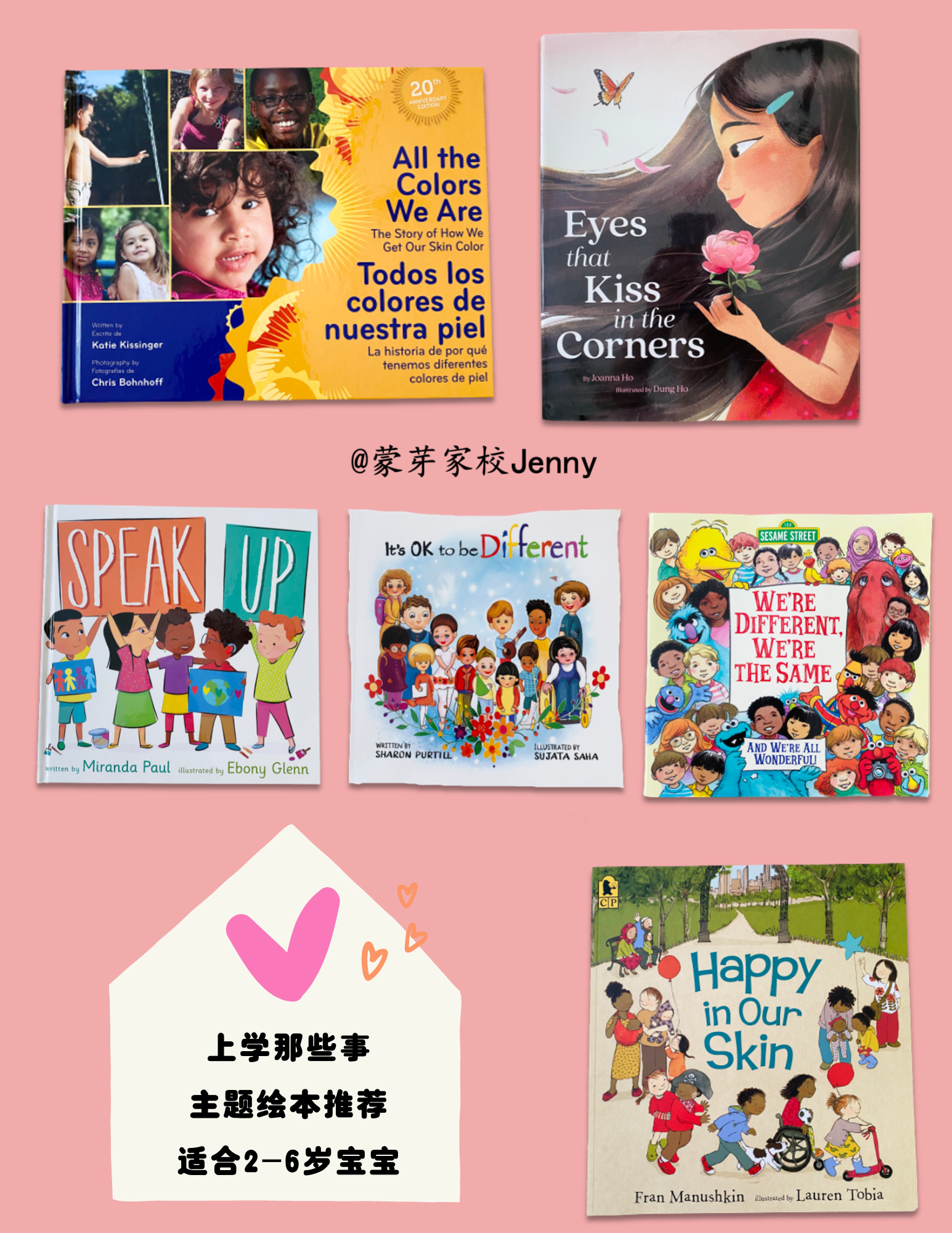
What do we as parents need to do to prepare for our baby's first day of school?
School is about to start, what do we need to do to prepare for sending our children to school for the first time? Today I'd like to share with you some tips that I sent to parents when I was teaching in kindergarten.
1, read some books on the topic of "school".
The books I recommend to you are all related to the topic of "school", and they are all good books that I checked out from the library and read slowly to my children at home, and then picked out. For children born overseas, you need to read more of the books in Figure 4, so that your child can realize that we are all different and embrace that difference.
2. Visit schools and classrooms with your child in advance.
Visiting schools and classrooms may be relatively difficult during an epidemic, but we can take our children for a walk outside the school to get a feel for the surroundings ahead of time. Due to the unique nature of the epidemic, parents may consider printing some pictures of school buildings and classrooms and then introducing the school and classrooms to their children.
3. Arrange the school schedule at home as early as possible.
As much as possible, match the school hours to regulate your child's work and rest time at home, and plan ahead so that your child will adapt to the school hours more easily.
4. Bring a personal item for your child, such as a favorite pillow or picture book.
The premise is that the school allows you to bring personal items that are not required by the school.
5. If your child has never been cared for by anyone else, possibly consider briefly leaving your child with a relative or trusted friend. This will help your child establish that you will come to pick up ta home and that ta is safe with others.
6. Be sure to give your child lots of hugs on the day you send them to school.
When we feel distressed, our lower brain triggers the release of the stress hormone cortisol, which prepares our bodies for the fight or flight response. To help a child in distress, hugs are one of the most effective ways to help. A hug or cuddle facilitates the release of oxytocin, a feel-good chemical that can bring down cortisol levels.
7. Don't forget to say goodbye when parents leave, and also point out the time to come back.
Not sneaking away - Sneaking away may make parents feel better because they don't have to deal with their child's devastating cries. But for the child, being left behind can damage the child's trust in you. So don't just sneak away. Make sure you say goodbye before you leave to build trust. Some parents develop a goodbye routine that makes leaving slightly easier and more fun (e.g., a goodbye song, a goodbye handshake, etc.). Parents should point to the clock to let their child know when you will be back to pick up the ta (and mean it!) ), even if your child doesn't know how to read a clock yet. The important thing is that ta know that you will be back at a certain point in time.
8. Pick up your child early in the first week.
Many preschool programs have a short school day the first week, such as the 9:00-1:00 preschool program, and often schedule 9:00-10:30 the first week to let your child get used to school life first, and parents need to pick up their children early. Parents need to come early to pick up their children. After the children get used to it, the time they spend at school will slowly increase.
9. Encourage independence
Learn some simple self-care skills, generally speaking to enter the 3-year-old preschool, the school will require the child to be fully potty trained has learned to go to the toilet. Some Montessori CASA classes have stricter requirements, and children should be able to take off their own pants, go to the toilet, put on their pants, wash their hands and other self-care skills. Therefore, it is important to know the school's rules before sending your child to school. While no one expects a 2-4 year old to be able to do everything on their own, age-appropriate independence is important. Real tasks allow children to learn to take care of themselves, and these will give them a real sense of accomplishment.
10. Tell your child stories about when we went to school, share our feelings, find out about your own childhood photos and discuss them with your child. Traditional Montessori schools include "telling real stories" in their oral curriculum, and Montessori families can also use this opportunity to do "telling real stories". Parents can start by describing the story in words, then show the pictures to the child, and finally discuss the pictures with the child using a "question and answer" game.





Comments